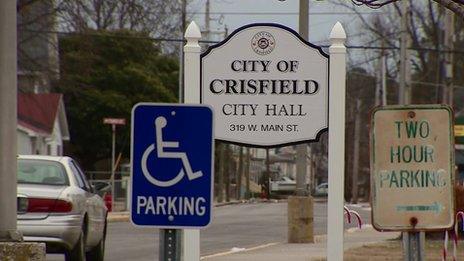Small town American Dream
- Published
- comments

Coming into Crisfield, a small town on the eastern seaboard of Maryland, the first sight is of a deserted main street with empty storefronts on either side.
Driving further into town, I see rows of foreclosure signs hanging in front of derelict houses - many people have been unable to keep up with their repayments.
After driving three hours from Washington DC, we are hungry - but unable to find a restaurant to eat in. The ones that we see on the web are no longer open for business. The closest thing to a place to eat is a store selling raw seafood. The clerk cooks some for us and allows us to sit in the corner to eat.
A short drive through the town centre and we reach the harbour. The frozen sheets of ice on the water mirror the economic deep freeze that small towns like this have endured since the big banks in New York dragged the US into recession five years ago.
But the people I meet don't blame the bankers - a popular pastime at dinner parties in the capital. Instead, the mayor of Crisfield, PJ Purnell, says: "There's a joke that we tell around here - if there's a Depression it'd take us ten years to see it because we've been depressed for so long."
'Empty streets'
And that's been the reality for rural America. When I ask what could make a difference for his town, which suffers from high unemployment and few opportunities for its young people, PJ says: "Hyundai could come and build a factory here. That would create jobs."
He asks me what it would take. As I look around the empty streets and the boarded-up shops, it's hard to see what would attract the Korean carmaker - one of the biggest companies in the world - to come to this small town or indeed to any small town in rural America.
So this is the big challenge confronting America. How can it put the process of de-industrialisation into reverse? No other country has managed it. So can the United States re-balance its economy towards manufacturing once again?
I meet local businessman Eugene Evans, who owns a boat repair business. It's rather larger than a typical shop - more like a yard strewn with boats and commercial shipping vessels. When times were good, he wasn't just repairing boats.
He tells me that he had 24 employees and they built up to 19 boats a year. Now, he's down to 5 staff, including members of his family. And there's little activity when I visit on this cold afternoon.
It's people like Eugene that the US central bank, the Federal Reserve, and the government are seeking to help with their stimulus and spending programmes. The Fed has made bringing down unemployment one of its aims and has pledged to keep interest rates low until there's a significant fall in the jobless rate.
For the Fed's policy to work, it needs small businesses like Eugene's to hire. Eugene tells me that he sees nothing from the Fed or the government that makes him confident enough to do that. A pledge of low rates is clearly not enough to convince a business owner in a small town like Crisfield.
Yet, despite the odds, Eugene is hopeful that customers will return and the good times will come again.
Better times?
There are always better times ahead is the trait that I most associate with America - the sense that anything is possible if you work hard enough.
It was the message in President Obama's State of the Union address; that the American Dream is what defines the nation, a place where the son of a barkeeper could become the Speaker of the House of Representatives and the son of a single mom can become president.
As I walk through the deprived town of Crisfield, I wonder if there really are better times to come here. I'm struck by the image of several retirees who are still working to put together steel mesh cages to catch the crabs that Maryland is known for.
It makes me recall what a former American ambassador once said to me. He used to travel the world and marvel at how much better things were in the US. He now admires how other countries have the better airports and hotels.
We have all heard about the relative decline of the US as emerging economies like China outpace its growth. But, we're reassured by the experts that America remains the most powerful nation on earth.
Statistically, that may be the case. But, for Crisfield, economic decline doesn't feel relative but worryingly absolute.
From Our Own Correspondent is broadcast on Radio 4 at 11:00 GMT on Thursday, and 11:30 GMT on Saturday.